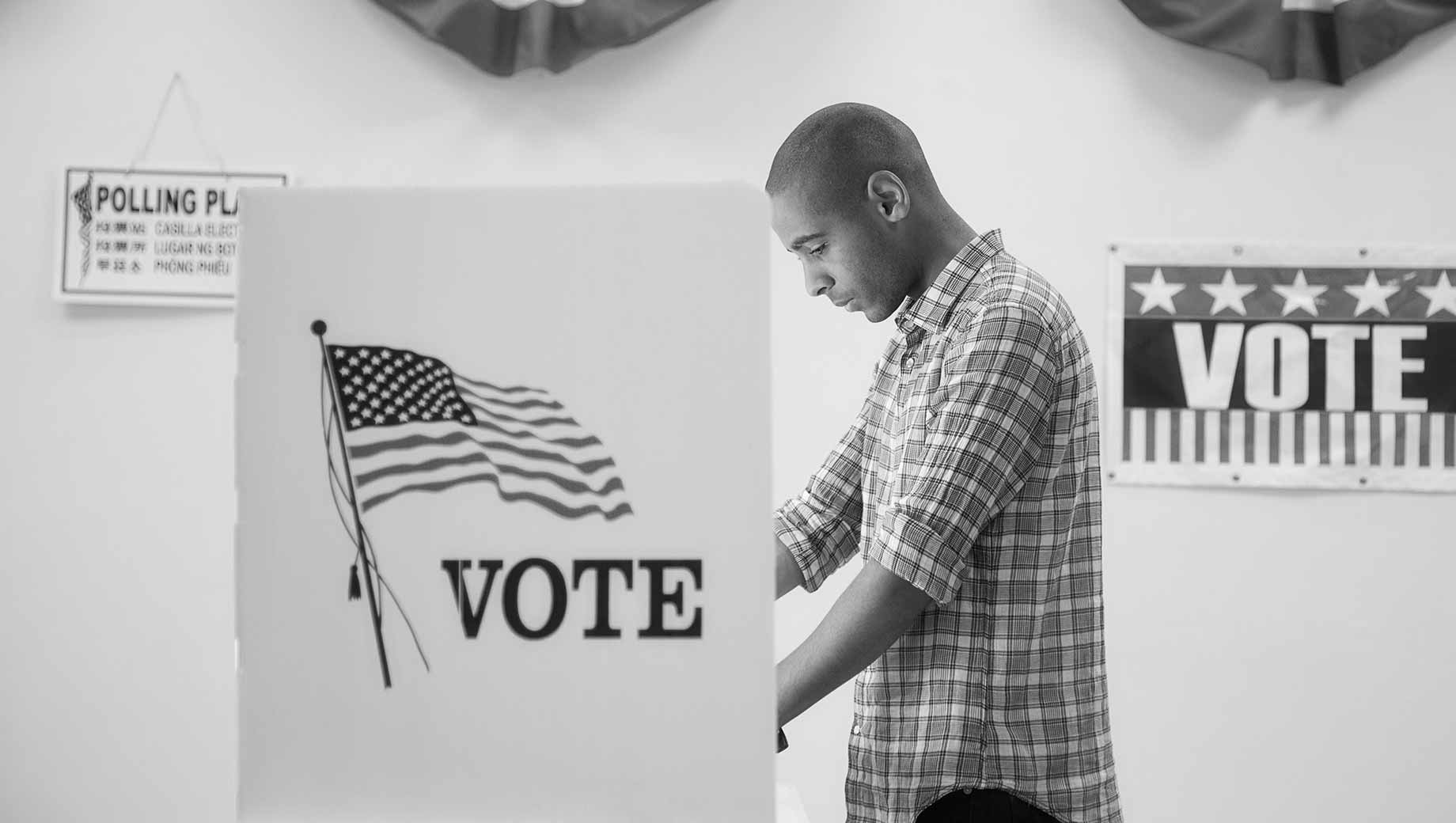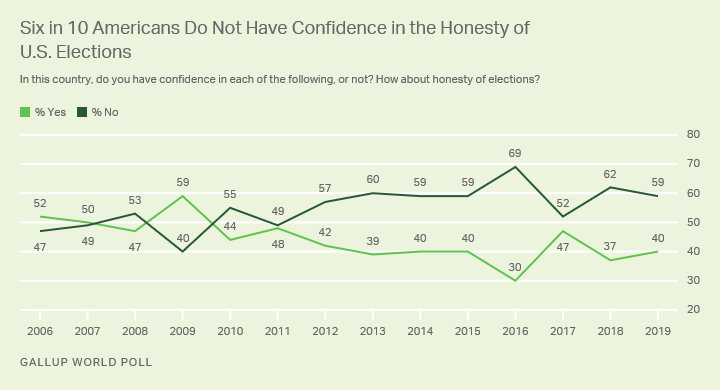Gallup published a survey yesterday that found nearly 6 in 10 Americans have lost faith in our elections---putting us toward the bottom of the list of wealthy democratic countries.
While that may not be surprising to many, some of the reasons may be.
And---Happy Valentine's Day.
Be informed.
Dr. Robert Knight has written an excellent article with Valentine's Day in mind. I recommend you read it.
Any poll or survey is a snapshot in time. People's feelings about things change daily, particularly about politics. But snapshots are important to being informed.
A snapshot of our times.
Gallup begins with this:
WASHINGTON, D.C. -- Although their faith has been shaken for some time, Americans are heading into their next presidential election with relatively little confidence in the honesty of the process. Four in 10 Americans (40%) interviewed in 2019 said they are confident in the honesty of elections in the country, while the majority (59%) said they are not.
Americans' current level of confidence in their elections is far from the lowest it has been at times in the past decade, but it is notably one of the worst ratings across the world's wealthiest democracies. Ratings were statistically lower last year only in Chile (31%) and Mexico (30%).
The survey found Finland and Norway have the most confidence (89%) and Mexico with the lowest (30%).
I encourage you to take 2 minutes and follow the link above and take a look at the entire survey.
A closer look at the snapshot on elections.
- Males are more trusting than females. Males-46% trusting, 54% not trusting. Females-46% trusting, 65% not trusting.
- Older people are a little more trusting than younger--but not much. Age 15-29; 42% trust, 58% not trust. Age 30-49; 31% trust, 68% not trust. Age 50+; trust 45%, not trust 54%.
- Urban and rural---city and country folks. Urban; 39% trust, 61% not trust. Rural; 43% trust, 57% not trust.
- The most distrusting group is the age group 30 to 49---68%
The bottom line.
Gallup says this is the bottom line:
Whether related to issues of foreign interference, security vulnerability, interference in the nomination process by the political elites, or just general frustration with an election outcome, the majority of Americans do not have confidence in their elections. The recent Iowa Caucuses are an example of the types of events that can shake Americans' faith in the election process and the legitimacy of the winners of elections. Institutions and fair processes are important in holding society together, and particularly so in this era of intense partisanship in the U.S.
We got to this point because of the attack on our institutions. And our own apathy.
On October 5, 1840, Daniel Webster, said to be the most effective senator to ever serve in our US Senate, told a public reception sponsored by the "Ladies of Richmond,"
"Impress upon children the truth that the exercise of the elective franchise is a social duty as solemn a nature as man can be called to perform; that a man may not innocently trifle with his vote...every measure he supports has an important bearing on the interests of others as well as on his own."
In a different speech, Daniel Webster said this:
"Finally, let us not forget the religious character of our origin. Our fathers were brought here by their high veneration for the Christian religion, They journeyed by its light, and labored by its hope. They sought to incorporate its principles with the elements of their society, and to diffuse its influence through all their institutions, civil, political, or literary."
We have not taken Webster's counsel.
There's little debate that modern-day American universities, public education, mainstream media, Hollywood and political advocacy groups are dominated by Leftists. And they have removed the "founding principles."
This is no accident. It is a deliberate strategy developed more than 80 years ago by Antonio Gramsci---probably more proficient in Marxism than Karl Marx himself.
He is credited with the blueprint for what we are experiencing today in our America.
Gramsci taught that the Bolshevik Russian revolution of 1917 worked because the conditions were right, but in western societies, he noted,
"The massive structures, both as state organizations, and as complexes of associations in civil society, constitute for the art of war, as it were, the 'trenches' and permanent fortifications of the front in the war position."
Gramsci's goal was the same as his hero, Karl Marx: to overthrow the institutions, but he knew it would have to be done differently to actually destroy the institutions of the West---particularly because America's institutions were "diffused with the principles of religion"---specifically Christianity.
Rudi Dutschke, a German student activist in the 1960s and follower of Gramsci and his Marxist teaching, came up with the phrase, "The long march through the institutions," to describe how old-style Marxism, could be converted to "cultural Marxism" and ultimately bring down the greatest nation of all. But it would require a long term commitment. And a clear understanding of the goal.
The 1998 book, "The Antonio Gramsci Reader," gave the clear strategy for ushering in Gramsci's new socialist revolution. And it is the "long march through the institutions."
This is about more than the 2020 elections.
Gramsci's revised version of Marxism is alive and well and generally known as "Cultural Marxism." There are groups of his followers embedded all around the country.
The Washington Examiner recently published an article titled, "Pete Buttigieg's father was a Marxist Professor who lauded the Communist Manifesto."
The story documents that Pet's dad who "spoke often and fondly of the Communist Manifesto and dedicated a significant portion of his academic career to the work of Italian Communist Party founder Antonio Gramsci, an associate of Vladimir Lenin."
Does Pete agree with his father? I don 't know, but he's no conservative---or even a "moderate," as he claims.
One thing is certain, Bernie Sanders does. He's running on a form of Gramsci's teaching. Elizabeth Warren has been trying to do the same, but is so conflicted she can't stay on message.
Gallup's survey reflects more than a moment in time. It reflects the results of decades of work on the part of many like Professor Buttigieg.
It also reflects the consequences of silent pulpits in churches, and apathetic biblical Christians.
It's time for the Church to awaken.
Senator Daniel Webster has more counsel for us:
"If we abide by the principles taught in the Bible, our country will on prospering and to prosper; but if we and our posterity neglect its instruction and authority, no man can tell how sudden a catastrophe may overwhelm us and bury all our glory in profound obscurity."
Be Informed. Be Vigilant. Be Active. Be Prayerful. Be Faithful.




